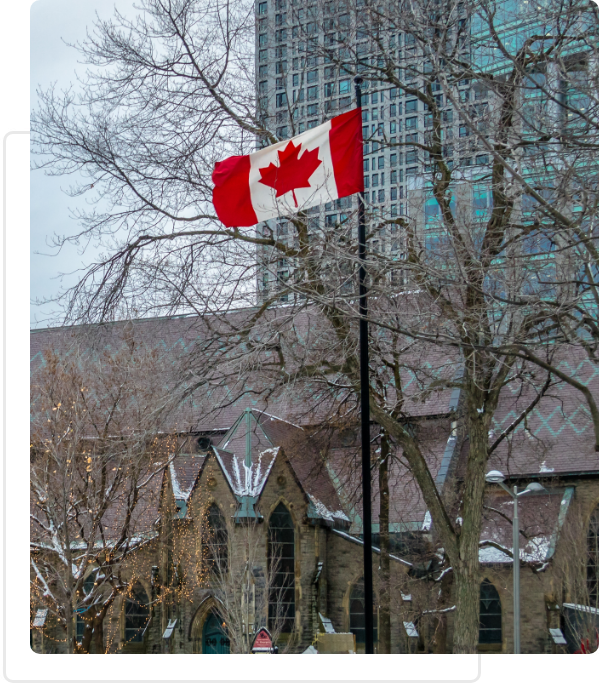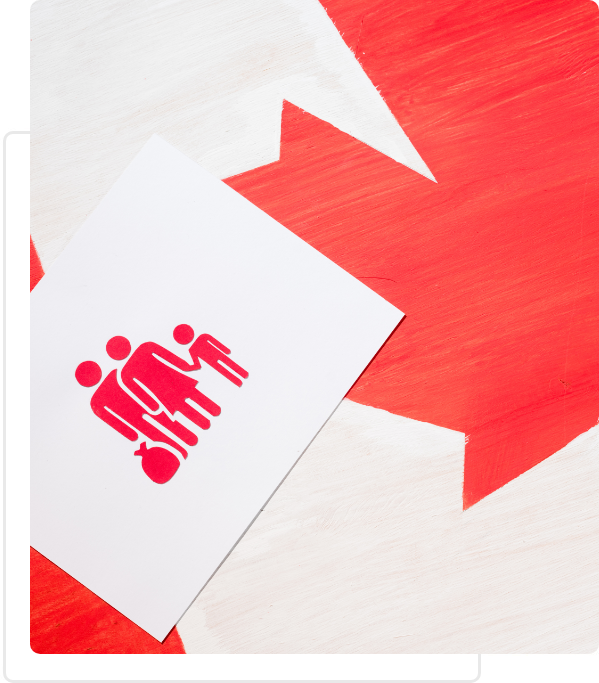Spousal Sponsorship - Bring Your Partner To Canada
Canadian citizens and permanent residents have the opportunity to sponsor their spouse or common-law partner for immigration to Canada, granting them permanent resident status. This enables couples, and families where applicable, to establish their lives in Canada.
This sponsorship program falls under the Family Class category, which is a significant avenue for Canada to welcome new permanent residents each year. Through the spousal sponsorship program, spouses and partners of Canadian citizens and permanent residents can immigrate to Canada. The specific requirements and processes for sponsorship vary depending on various factors. Here, we provide an overview of how individuals can bring their wife, husband, or common-law partner to Canada.

Who Can Be Sponsored?
Individuals eligible to be sponsored through the spousal sponsorship program include:
- Spouse: A legally married partner.
- Common-law Partner: A person with whom the sponsor has been living in a conjugal relationship for at least one year.
- Conjugal Partner: A person living outside Canada who has been in a relationship with the sponsor for at least one year but cannot live together or marry due to extenuating circumstances such as immigration barriers, religious reasons, or sexual orientation.
It’s important to note that the sponsor must be a Canadian citizen or a permanent resident to sponsor a spouse or partner for immigration to Canada. Additionally, both the sponsor and the sponsored individual must meet certain eligibility criteria set by Immigration, Refugees, and Citizenship Canada (IRCC) to qualify for the spousal sponsorship program.
Who can sponsor their spouse in Canada?
In Canada, both Canadian citizens and permanent residents have the opportunity to sponsor their spouse for immigration. This means that if you are a Canadian citizen or a permanent resident, you are eligible to sponsor your spouse to come and live with you in Canada as a permanent resident. However, it’s essential to meet the eligibility criteria set by Immigration, Refugees, and Citizenship Canada (IRCC) and fulfill all sponsorship requirements to ensure a successful application process.
The requirements for sponsoring a spouse in Canada include:
- Status: You must be a Canadian citizen or a permanent resident of Canada.
- Age: You must be at least 18 years old.
- Relationship: You must be legally married to your spouse or in a common-law or conjugal partnership. Proof of the genuineness of the relationship is required.
- Financial Responsibility: You must demonstrate the ability to financially support your spouse and any dependent children. This includes meeting the Minimum Necessary Income (MNI) requirement, which varies depending on the size of your family unit.
- Residency: You must reside in Canada, except in cases where you are a Canadian citizen living abroad intending to return to Canada with your spouse.
- No Default: You must not be in default of any previous sponsorship undertaking or court-ordered family support payments.
- Security and Criminality: You and your spouse must undergo security and criminality checks.
- Medical Examination: Your spouse must undergo a medical examination to ensure admissibility to Canada.
- Admissibility: Your spouse must meet all admissibility requirements, including health, security, and criminality checks.
- Consent: Both you and your spouse must consent to the sponsorship.
These are general requirements, and specific circumstances may require additional documentation or steps. It’s advisable to consult the most recent guidelines from Immigration, Refugees, and Citizenship Canada (IRCC) or seek legal advice to ensure compliance with all requirements.
How long does it take for spousal sponsorship in Canada?

The processing time for spousal sponsorship applications in Canada can vary depending on several factors, including the type of application (inland or outland), the completeness of the application, the workload of the visa office processing the application, and any additional circumstances such as requests for additional information or interviews.
As of my last update, general processing times provided by Immigration, Refugees and Citizenship Canada (IRCC) indicated that most spousal sponsorship applications were processed within approximately 12 to 24 months. However, these processing times are subject to change and may vary based on individual circumstances.
It’s essential to keep in mind that processing times are not guaranteed and can fluctuate. Delays may occur if the application is incomplete, if additional information or documentation is requested, or if there are other factors affecting processing times.
Applicants can check the current estimated processing times for spousal sponsorship applications on the IRCC website or through the IRCC Client Application Status tool. Additionally, seeking advice from an immigration consultant or lawyer familiar with Canadian immigration processes can provide more personalized guidance on expected timelines and help navigate the application process efficiently.
Spousal Sponsorship Canada: Understanding Inland and Outland
In Canadian immigration, spousal sponsorship refers to the process where a Canadian citizen or permanent resident sponsors their spouse or common-law partner to immigrate to Canada. There are two main categories for spousal sponsorship: inland and outland.
- In inland sponsorship, the sponsored spouse or partner resides with the sponsor in Canada during the processing of their application.
- The sponsored person may be eligible for an open work permit while their application is being processed, allowing them to work in Canada while awaiting the outcome of their sponsorship application.
- Inland sponsorship is typically faster than outland sponsorship, as the sponsored person is already in Canada.
- In outland sponsorship, the sponsored spouse or partner resides outside Canada during the processing of their application.
- The sponsored person may be able to visit Canada during the processing of their application but cannot stay in Canada for extended periods without other legal status, such as a visitor visa.
- Outland sponsorship may take longer than inland sponsorship due to processing times at Canadian visa offices outside Canada.
It’s essential to carefully consider which option is best for your situation. Factors such as processing times, the ability to work or visit Canada during the application process, and personal circumstances should be taken into account when choosing between inland and outland sponsorship. Additionally, eligibility criteria and requirements may vary between the two categories, so it’s advisable to consult the official website of Immigration, Refugees and Citizenship Canada (IRCC) or seek professional advice for specific guidance tailored to your situation.
How much does it cost for spousal sponsorship in Canada?
Sponsoring your spouse, common-law partner, or conjugal partner for Canadian immigration incurs mandatory immigration fees totaling CAD$1,050. These fees cover essential aspects of the sponsorship process. Here’s the breakdown:
- Sponsorship Fee: CAD$75
- Processing Fee: CAD$475
- Right of Permanent Residence Fee (RPRF): CAD$500
It’s crucial to note that these fees are subject to change and may vary based on individual circumstances. Additionally, there are other associated costs related to the immigration process that applicants should anticipate. These may include expenses for obtaining necessary documents, postage fees, and potentially the services of an immigration representative if you choose to work with one.
To ensure you have the most accurate and up-to-date information regarding fees and costs associated with spousal sponsorship in Canada, it’s advisable to consult the official Immigration, Refugees and Citizenship Canada (IRCC) website or directly contact IRCC for guidance.


How much income do you need to sponsor your spouse in Canada?
In most cases of spousal sponsorship in Canada, there isn’t a minimum income requirement to sponsor your spouse, common-law partner, or conjugal partner. However, as a sponsor, you are obligated to sign an undertaking agreeing to provide for their basic financial needs for typically a three-year period.
During this time, it’s your responsibility to ensure that the sponsored person has access to essential requirements such as:
- Food, clothing, shelter, and other necessities for daily living.
- Coverage for dental care, eye care, and other health needs not covered by public health services.
It’s important to note that if the person you sponsor receives social assistance from the Canadian government during the undertaking period, you become financially liable for this assistance.
Please be aware: If you’re sponsoring a spouse who has dependent children, and one of those dependent children has children of their own, you may be required to meet a minimum income level in this specific circumstance.
Possible Refusal Reasons for Spousal Sponsorship Application
Spousal sponsorship applications can be refused for various reasons, ranging from incomplete documentation to concerns about the genuineness of the relationship. Here are some common reasons why a spousal sponsorship application might be refused:
- Incomplete Application: If the application is missing required documents or information, it may be refused.
- Ineligibility: The sponsor or the sponsored person may not meet the eligibility criteria for spousal sponsorship, such as being a Canadian citizen or permanent resident, or being in a genuine relationship.
- Criminality: If either the sponsor or the sponsored person has a criminal record or poses a security risk, the application may be refused.
- Misrepresentation: Providing false information or withholding relevant information on the application can lead to refusal.
- Genuineness of Relationship: Immigration authorities assess whether the relationship between the sponsor and the sponsored person is genuine. If they have doubts about the authenticity of the relationship, the application may be refused.
- Financial Inadmissibility: If the sponsor does not meet the financial requirements to support the sponsored person, the application may be refused.
- Medical Inadmissibility: If the sponsored person has a medical condition that could pose a risk to public health or safety or cause excessive demand on Canada’s healthcare system, the application may be refused.
- Previous Immigration Violations: If either the sponsor or the sponsored person has previously violated immigration laws or been refused entry to Canada, it could lead to a refusal.
- Failure to Attend Interviews or Medical Exams: Missing scheduled interviews or medical exams without a valid reason can result in application refusal.
It’s crucial to carefully review the eligibility requirements and provide accurate and complete information when submitting a spousal sponsorship application. Seeking guidance from an immigration lawyer or consultant can also help ensure that the application is prepared correctly and has the best chance of success.
What is the process for sponsoring my spouse for Canadian immigration?
The process for sponsoring your spouse for Canadian immigration involves several steps. Here’s an overview of the typical process:
Determine Eligibility:
- Ensure that you, as the sponsor, meet the eligibility criteria to sponsor your spouse. This includes being a Canadian citizen or permanent resident, being at least 18 years old, and meeting financial requirements if applicable.
Gather Documents:
- Gather the necessary documents for both the sponsor and the sponsored spouse. These may include proof of identity, marriage or relationship documentation, police certificates, medical exams, and other supporting documents.
Comply with Obligations:
- Both the sponsor and the sponsored spouse must comply with their obligations under the sponsorship agreement, including financial support and other commitments.
Processing of Application:
- After receiving the application, IRCC will process it and may request additional information or documents if needed.
- The application will undergo medical and background checks.
Interview (if required):
- In some cases, IRCC may request an interview with the sponsor and/or the sponsored spouse to assess the genuineness of the relationship.
Decision:
- Once the application is processed, IRCC will make a decision on whether to approve or refuse the sponsorship.
- If approved, the sponsored spouse will receive permanent resident status in Canada.
Conditional Permanent Residence (if applicable):
- In some cases, sponsored spouses may receive conditional permanent residence, which requires them to live with their sponsor for a certain period before the conditions are removed.
Finalization of Permanent Residence:
- After the sponsorship is finalized, the sponsored spouse can apply for a Permanent Resident Card.
Submit the Application:
- Complete the sponsorship application package provided by Immigration, Refugees and Citizenship Canada (IRCC). This includes both the sponsorship application and the permanent residence application for the sponsored spouse.
- Pay the required application fees.
- Submit the application package by mail or online through the IRCC website, depending on the specific instructions provided.
Landing in Canada:
- If the sponsored spouse is outside Canada, they will need to attend an interview and obtain their permanent resident visa before traveling to Canada.
- If the sponsored spouse is already in Canada, they may be eligible for an open work permit while their application is being processed.
It’s important to note that the spousal sponsorship process can vary based on individual circumstances, and additional steps or requirements may apply in certain cases. Applicants should carefully follow the instructions provided by IRCC and seek guidance from an immigration consultant or lawyer if needed.
Getting help with the common-law / spousal sponsorship Canada immigration process
Seeking assistance from a reputable law firm like Kurzfeld Law Firm can greatly aid in navigating the common-law or spousal sponsorship process for Canadian immigration. They offer expertise in eligibility criteria, documentation requirements, and procedural aspects. Kurzfeld Law Firm can prepare and submit your application accurately, handle communication with immigration authorities, and provide legal representation if needed. With their guidance, you can navigate the complexities of the sponsorship process smoothly, ensuring compliance and maximizing your chances of a successful outcome.




